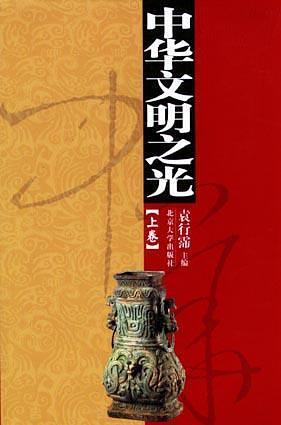Author: Yang Shaowei, Master of Arts, China Academy of Art
When it comes to the cultural history of China, it is necessary to understand the specific meaning of this term first. What is China culture? What is cultural history? Mr. Yuan Xingpei wrote a set of two volumes of Light of Chinese Civilization, and Dr. Wu Jun, as a leading figure in the computer field, also published a set of Light of Civilization. From the title, we can see that their emphasis is on the keyword "civilization". Therefore, distinguishing the difference between "culture" and "civilization" is the premise of talking about culture, and then it can be called "cultural history".

The Light of Civilization by Wu Jun.
So, what is culture? What is civilization? In The Light of Civilization, Dr. Wu Jun mainly analyzes English roots. The word "Civilization" comes from the root word Civil, that is, the meaning of city. There are two criteria in western academic circles: one is the emergence of class, and the other is the emergence of city. Compared with "civilization", the definition of culture is loose and complicated. The word "Culture" in the west means farming and breeding, that is to say, when human beings settle down, they begin to have culture with agriculture and animal husbandry. When introducing the ancient society in China, we often use the words "Yangshao culture" and "Longshan culture" instead of the word "civilization". It should be said that this description is scientific and accurate. Some old historians, such as Mr. Qian Mu’s Introduction to the Cultural History of China, have made a perceptual and macroscopic interpretation of China’s culture and civilization. Mr. Qian Mu believes that civilization is outward and belongs to the material aspect, and civilization can spread and accept outward. However, cultural bias belongs to the spiritual aspect, which must be produced by the spiritual accumulation within the group. Culture can produce civilization, but civilization may not produce culture.
China culture is reflected in the whole history of China, and it is impossible to talk about culture except history. We should explain the truth of China culture from the objective aspects of all history. So, what is the relationship between cultural history research and historical research? In my opinion, there is a subordinate relationship between them. The study of cultural history should follow the academic norms and basic methods of historical research, and speak with historical materials and evidence. In terms of emphasis, historical research can be big or small, regardless of details. We can make a macro study of a historical period and grasp the trend of the times. For example, Mr. Chen Yinke’s Brief Discussion on the System Origin of Sui and Tang Dynasties and the Political History of Tang Dynasty, and Gu Jiegang and Mr. Shi Nianhai’s History of China’s Territory Evolution are all extremely grand works. We can also focus on the micro, and study the whole historical process through a person, an artifact, a food and even a Chinese character in history, such as Ji Xianlin’s History of Sugar, Li Bozhong’s Firearms and Account Books and Jared Diamond’s Guns, Germs and Steel, while the study of cultural history focuses more on macro aspects.
If history is the study of "who we are" and "where we come from", then cultural history is the study of "why I am me" and "why we come from there instead of anywhere else". The macroscopic study of cultural history is similar to that of philosophy to some extent. Philosophy studies the nature of the universe, the general law of the evolution of all things in the universe, the position of people in the universe and other basic issues. Einstein once said that philosophy is the mother of all sciences, and its emphasis is on philosophical speculation and macro. Obviously, the study of cultural history cannot be said to be the mother of all historical studies, but it is also an extremely important part of historical studies. Culture involves everyone’s life, whether it is past, present or future. Therefore, Mr. Qian Mu believes that to answer what is China culture, we need to look for the value and significance of culture in the cultural tradition of China from a philosophical perspective and a historical perspective.

The Light of Chinese Civilization by Yuan Xingpei.
The complexity of culture requires researchers to broaden their minds and look at the general situation, instead of focusing on details alone, the study of cultural history must be grand. Culture is the life of a country and a nation. If a country does not have culture, there will be no life. We say that only China, among the four ancient civilizations, has never been annihilated, which is also in terms of its culture. From the narrow view of the founder of the regime, China died after Yuan and Qing Dynasties, and this view still exists, such as there was no China after Cliff Mountain, and China died in Manchu Dynasty. From this point of view, without a grand cultural view, it is easy to equate the study of cultural history with the study of history, or even fall into a narrower situation. The study of cultural history should not be entangled in the "gains and losses of a city", but should be strategically located and explain its views. Geographical background, life concept, writing, political system, literature and art, religion and other aspects can all be used as the starting point for the study of cultural history.
The integrity of culture causes its complexity to be reconciled into a whole, which can be summarized by "pulling one hair and moving the whole body". In fact, this is also very understandable. Wei, Jin, Southern and Northern Dynasties is a chaotic era. The invasion of ethnic minorities has led to changes in the political system and social class, but it has also promoted the integration of ethnic groups. The corresponding life concepts, religions, literature and art are changing. The cultural variation looks extremely complicated, but it can eventually find a key point, thus being classified as a whole, and cultural psychology and cultural character will gradually become full and diverse in the change.
In addition, culture has an irresistible development. As mentioned above, culture is the life of a nation, and since it is life, it needs to grow and develop. Usually, the study of China culture is divided into several sections, and there is obvious change between each section, and the development between sections is even more obvious. Once a culture becomes rigid and stops moving forward, it is not far from death. One of the significance of the study of cultural history is to see its development law clearly, and to tell the past and think of the future.
Today’s cultural studies still don’t grasp these three points very well. The pattern is either too small and cumbersome, or too big and empty, because the culture is too big and everyone has something to say. The academic norms of cultural history research have not been effectively established, and the books published in the market are mixed, and everyone wants to get a slice of the "cultural fever". Of course, we can’t give up eating because of choking. The study of cultural history by predecessors such as Mr. Qian Mu, Mr. Liu Yizhi and Mr. Yu Yingshi has provided us with a macro idea and discipline norms. As a younger generation, we are more diligent than Ying Qin and make a modest contribution to discipline construction. (Yang Shaowei)
Guangming. com’s literary criticism channel has long collected excellent manuscripts for the society. You are cordially invited to make comments with attitude, temperature and depth around literary and artistic works, events and phenomena. The article should be within 2000 words, with clear meaning and complete content. Once the manuscript is adopted, the corresponding remuneration will be paid. Please leave your contact information. Thank you for your attention and support! Submission email:wenyi@gmw.cn。